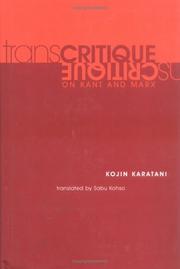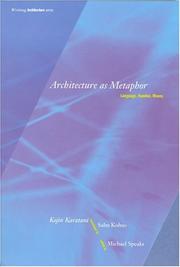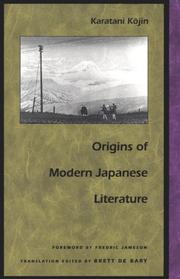| Listing 1 - 10 of 15 | << page >> |
Sort by
|

ISBN: 0262112744 9780262112741 Year: 2003 Publisher: Cambridge (Mass.): MIT Press,
Abstract | Keywords | Export | Availability | Bookmark
 Loading...
Loading...Choose an application
- Reference Manager
- EndNote
- RefWorks (Direct export to RefWorks)
Kant, Immanuel, --- Marx, Karl, --- Contributions in political science. --- Contributions in economics. --- Kant, Immanuel --- -Kant, Immanuel --- -Marx, Karl. --- Marx, Karl --- Contributions in Economics --- Contributions in political science --- Marx, Karl. --- Kant, Emmanuel --- Kant, Emanuel --- Kant, Emanuele --- Political and social views. --- Kant, I. --- Kānt, ʻAmmānūʼīl, --- Kant, Immanouel, --- Kant, Immanuil, --- Kʻantʻŭ, --- Kant, --- Kant, Emmanuel, --- Ḳanṭ, ʻImanuʼel, --- Kant, E., --- Kant, Emanuel, --- Cantơ, I., --- Kant, Emanuele, --- Kant, Im. --- קאנט --- קאנט, א. --- קאנט, עמנואל --- קאנט, עמנואל, --- קאנט, ע. --- קנט --- קנט, עמנואל --- קנט, עמנואל, --- كانت ، ايمانوئل --- كنت، إمانويل، --- カントイマニユエル, --- Kangde, --- 康德, --- Kanṭ, Īmānwīl, --- كانط، إيمانويل --- Kant, Manuel, --- Makesi, --- Ma-kʻo-ssu, --- 马克思, --- 馬克思, --- Marukusu, --- マルクス, --- Marx, Heinrich Karl, --- Marks, Karl, --- Marx, Carlos, --- Marks, K. --- Marŭkʻŭsŭ, Kʻal, --- 마르크스, 칼, --- Marksŭ, --- 맑스, --- Marks, Karol, --- Mác, Các, --- Marx, Karel, --- Marksas, Karolis, --- Marx, Carlo, --- Mác, C., --- מארכס, --- מארכס, קארל, --- מארכס, קרל, --- מארכס, ק --- מארקס --- מארקס, קארל --- מארקס, קארל, --- מארקס, קרל, --- מארקס, ק. --- מרכס, קרל --- מרכס, קרל, --- ماركس، كارل --- ماركس، كارل، --- Markso, Karlo, --- Kant, Immanuel, - 1724-1804 - Contributions in political science. --- Kant, Immanuel, - 1724-1804 - Contributions in economics. --- Kant, Immanuel, - 1724-1804. --- Marx, Karl, - 1818-1883 - Contributions in political science. --- Marx, Karl, - 1818-1883 - Contributions in economics. --- Marx, Karl, - 1818-1883. --- Kant, Immanuel, - 1724-1804 --- Marx, Karl, - 1818-1883
Book
ISBN: 0822369133 9780822369134 0822368854 0822372711 Year: 2017 Publisher: Durham: Duke university press,
Abstract | Keywords | Export | Availability | Bookmark
 Loading...
Loading...Choose an application
- Reference Manager
- EndNote
- RefWorks (Direct export to RefWorks)
In Isonomia and the Origins of Philosophy—published originally in Japanese and now available in four languages—Kōjin Karatani questions the idealization of ancient Athens as the source of philosophy and democracy by placing the origins instead in Ionia, a set of Greek colonies located in present-day Turkey. Contrasting Athenian democracy with Ionian isonomia—a system based on non-rule and a lack of social divisions whereby equality is realized through the freedom to immigrate—Karatani shows how early Greek thinkers from Heraclitus to Pythagoras were inseparably linked to the isonomia of their Ionian origins, not democracy. He finds in isonomia a model for how an egalitarian society not driven by class antagonism might be put into practice, and resituates Socrates's work and that of his intellectual heirs as the last philosophical attempts to practice isonomia's utopic potentials. Karatani subtly interrogates the democratic commitments of Western philosophy from within and argues that the key to transcending their contradictions lies not in Athenian democracy, with its echoes of imperialism, slavery, and exclusion, but in the openness of isonomia.
Philosophy, Ancient --- Equality before the law --- Philosophy --- Democracy
Book
ISBN: 0262612070 Year: 2005 Publisher: Cambridge (Mass.) ; London : MIT,
Abstract | Keywords | Export | Availability | Bookmark
 Loading...
Loading...Choose an application
- Reference Manager
- EndNote
- RefWorks (Direct export to RefWorks)
Political science --- Economics --- Philosophy. --- Kant, Immanuel, --- Marx, Karl,
Book
Year: 1995 Publisher: Cambridge, Mass. Massachusetts Institute of Technology
Abstract | Keywords | Export | Availability | Bookmark
 Loading...
Loading...Choose an application
- Reference Manager
- EndNote
- RefWorks (Direct export to RefWorks)
Architecture --- architectural theory --- architectuurfilosofie
Book
ISBN: 9781788737791 9781788730587 1788730585 1788737792 Year: 2020 Publisher: London ; Brooklyn, NY : Verso,
Abstract | Keywords | Export | Availability | Bookmark
 Loading...
Loading...Choose an application
- Reference Manager
- EndNote
- RefWorks (Direct export to RefWorks)
"Originally published in 1974, Kojin Karatani's Marx: Towards the Centre of Possibility has been amongst his most enduring and pioneering works in critical theory. Written at a time when the political sequences of the New Left had collapsed into crisis and violence, with widespread political exhaustion for the competing sectarian visions of Marxism from 1968, Karatani's Marx laid the groundwork for a new reading, unfamiliar to the existing Marxist discourse in Japan at the time. Karatani's Marx takes on insights from semiotics, deconstruction, and the reading of Marx as a literary thinker, treating Capital as an intervention in philosophy that could be read as itself a theory of signs. Marx is unique in this sense, not only because of its importance in post-68 Japanese thought, but also because the heterodox reading of Marx that Karatani debuts in this text, centered on his theory of the value-form, will go on to form the basis of his globally-influential work"--
Socialism --- Marxian economics --- Communism and literature --- Marx, Karl, - 1818-1883 --- Communisme et littérature --- Économie marxiste --- Marx, Karl,
Book
ISSN: 14369591 ISBN: 3865837387 9783865837387 Year: 2012 Publisher: Leipzig : Leipziger Universitätsverlag,
Abstract | Keywords | Export | Availability | Bookmark
 Loading...
Loading...Choose an application
- Reference Manager
- EndNote
- RefWorks (Direct export to RefWorks)
Book
ISBN: 9780231157285 0231157282 9780231157292 0231157290 9780231528658 0231528655 1281897582 9786613792532 9781281897589 6613792535 Year: 2011 Publisher: New York Columbia University Press
Abstract | Keywords | Export | Availability | Bookmark
 Loading...
Loading...Choose an application
- Reference Manager
- EndNote
- RefWorks (Direct export to RefWorks)
Kojin Karatani, one of Japan's most influential thinkers, wrote the essays collected in History and Repetition during a period of radical historical change, triggered by the collapse of the Cold War order and the death of the Sh?wa emperor in 1989. Through an original reading of Marx, Karatani developed a theory of history based on the repetitive cycle of crises attending the expansion and transformation of capital. His work led to a rigorous theoretical analysis of political, economic, and literary forms of representation-joined by a detailed, empirical study of Japan's modern history-th
Historiography. --- Japan --- History --- Japan - History - 1868- - Historiography. --- Japan -- History -- 1868- -- Historiography.
Digital
ISBN: 9780822372714 Year: 2017 Publisher: Durham Duke University Press
Abstract | Keywords | Export | Availability | Bookmark
 Loading...
Loading...Choose an application
- Reference Manager
- EndNote
- RefWorks (Direct export to RefWorks)
In Isonomia and the Origins of Philosophy—published originally in Japanese and now available in four languages—Kojin Karatani questions the idealization of ancient Athens as the source of philosophy and democracy by placing the origins instead in Ionia, a set of Greek colonies located in present-day Turkey. Contrasting Athenian democracy with Ionian isonomia—a system based on non-rule and a lack of social divisions whereby equality is realized through the freedom to immigrate—Karatani shows how early Greek thinkers from Heraclitus to Pythagoras were inseparably linked to the isonomia of their Ionian origins, not democracy. He finds in isonomia a model for how an egalitarian society not driven by class antagonism might be put into practice, and resituates Socrates's work and that of his intellectual heirs as the last philosophical attempts to practice isonomia's utopic potentials. Karatani subtly interrogates the democratic commitments of Western philosophy from within and argues that the key to transcending their contradictions lies not in Athenian democracy, with its echoes of imperialism, slavery, and exclusion, but in the openness of isonomia.

ISBN: 0262611139 9780262611138 Year: 1995 Publisher: Cambridge (Mass.) : MIT press,
Abstract | Keywords | Export | Availability | Bookmark
 Loading...
Loading...Choose an application
- Reference Manager
- EndNote
- RefWorks (Direct export to RefWorks)
In Architecture as Metaphor, Kojin Karatani detects a recurrent "will to architecture" that he argues is the foundation of all Western thinking, traversing architecture, philosophy, literature, linguistics, city planning, anthropology, political economics, psychoanalysis, and mathematics. Kojin Karatani, Japan's leading literary critic, is perhaps best known for his imaginative readings of Shakespeare, Soseki, Marx, Wittgenstein, and most recently Kant. His works, of which Origins of Modern Japanese Literature is the only one previously translated into English, are the generic equivalent to what in America is called "theory." Karatani's writings are important not only for the insights they offer on the various topics under discussion, but also as an example of a distinctly non-Western critical intervention. In Architecture as Metaphor, Karatani detects a recurrent "will to architecture" that he argues is the foundation of all Western thinking, traversing architecture, philosophy, literature, linguistics, city planning, anthropology, political economics, psychoanalysis, and mathematics. In the three parts of the book, he analyzes the complex bonds between construction and deconstruction, thereby pointing to an alternative model of "secular criticism," but in the domain of philosophy rather than literary or cultural criticism. As Karatani claims in his introduction, because the will to architecture is practically nonoexistent in Japan, he must first assume a dual role: one that affirms the architectonic (by scrutinizing the suppressed function of form) and one that pushes formalism to its collapse (by invoking Kurt Godel's incompleteness theorem). His subsequent discussions trace a path through the work of Christopher Alexander, Jane Jacobs, Gilles Deleuze, and others. Finally, amidst the drive that motivates all formalization, he confronts an unbridgeable gap, an uncontrollable event encountered in the exchange with the other; thus his speculation turns toward global capital movement. While in the present volume he mainly analyzes familiar Western texts, it is precisely for this reason that his voice discloses a distance that will add a new dimension to our English-language discourse.
1 --- 13 --- Filosofie --- Cultuurfilosofie --- Architecture and philosophy --- Cross-cultural studies --- Structural analysis (Engineering) --- Architecture --- Philosophy --- Architecture - Philosophy

ISBN: 0822313235 082231312X 9780822313236 0822378442 1322091684 Year: 1998 Publisher: Durham, N.C.: Duke university press,
Abstract | Keywords | Export | Availability | Bookmark
 Loading...
Loading...Choose an application
- Reference Manager
- EndNote
- RefWorks (Direct export to RefWorks)
Since its publication in Japan ten years ago, the Origins of Modern Japanese Literature has become a landmark book, playing a pivotal role in defining discussions of modernity in that country. Against a history of relative inattention on the part of Western translators to modern Asian critical theory, this first English publication is sure to have a profound effect on current cultural criticism in the West. It is both the boldest critique of modern Japanese literary history to appear in the post-war era and a major theoretical intervention, which calls into question the idea of modernity that informs Western consciousness.In a sweeping reinterpretation of nineteenth-and twentieth-century Japanese literature, Karatani Kojin forces a reconsideration of the very assumptions underlying our concepts of modernity. In his analysis, such familiar terms as origin, modern, literature, and the state reveal themselves to be ideological constructs. Karatani weaves many separate strands into an argument that exposes what has been hidden in both Japanese and Western accounts of the development of modern culture. Among these strands are: the "discovery" of landscape in painting and literature and its relation to the inwardness of individual consciousness; the similar "discovery" in Japanese drama of the naked face as another kind of landscape produced by interiority; the challenge to the dominance of Chinese characters in writing; the emergence of confessional literature as an outgrowth of the repression of sexuality and the body; the conversion of the samurai class to Christianity; the mythologizing of tuberculosis, cancer, and illness in general as a producer of meaning; and the "discovery" of "the child" as an independent category of human being.A work that will be important beyond the confines of literary studies, Karatani's analysis challenges basic Western presumptions of theoretical centrality and originality and disturbs the binary opposition of the "West" to its so-called "other." Origins of Modern Japanese Literature should be read by all those with an interest in the development of cultural concepts and in the interrelating factors that have determined modernity.
J5500.70 --- J5930 --- Japanese literature --- -Japan: Literature -- history and criticism -- modern, Kindai (1850s- ), bakumatsu, Meiji, Taishō --- Japan: Literature -- modern fiction and prose (1868- ) --- history and criticism. --- History and criticism --- Japan: Literature -- history and criticism -- modern, Kindai (1850s- ), bakumatsu, Meiji, Taishō --- Meiji period, 1868-1912 --- History and criticism. --- Meiji period --- Japanese literature - Meiji period, 1868-1912 - History and criticism
| Listing 1 - 10 of 15 | << page >> |
Sort by
|

 Search
Search Feedback
Feedback About UniCat
About UniCat  Help
Help News
News